Havana is the capital city of Cuba, the largest island nation in the Caribbean. With an intriguing past and complex present, Havana is fascinating in many ways. But what exactly do you do as a visitor in this place that still appears to be warped in time? Here is our list of the top things to do in Havana.
Although we thought of putting a ranking to the list, we could not. Every activity, every place and every experience is special in its own way. So, we split the list into 5 different categories – History of Havana, City plazas, Quirky Experiences, Signature Drinks Experiences, and, Art, Culture, Performances.
History of Havana
Museo de la Revolución | Museum of the Revolution
Fidel Castro had started the Cuban Revolution in the 1950’s against the dictatorship regime of the then President Fulgencio Batista. This building used to serve as the Presidential Palace of Cuban Presidents until Batista. But, after the Revolution, it was converted to Museo de la Revolución. The museum preserves the exhibits of Cuban history, primarily focusing on this Cuban Revolution. It holds every little detail about the Revolution – why and how it started, how it was executed and what were the aftermaths. The exhibits include some incredible artifacts like the military uniforms worn by the likes of Che Guevara and handwritten military notes signed by Fidel Castro.
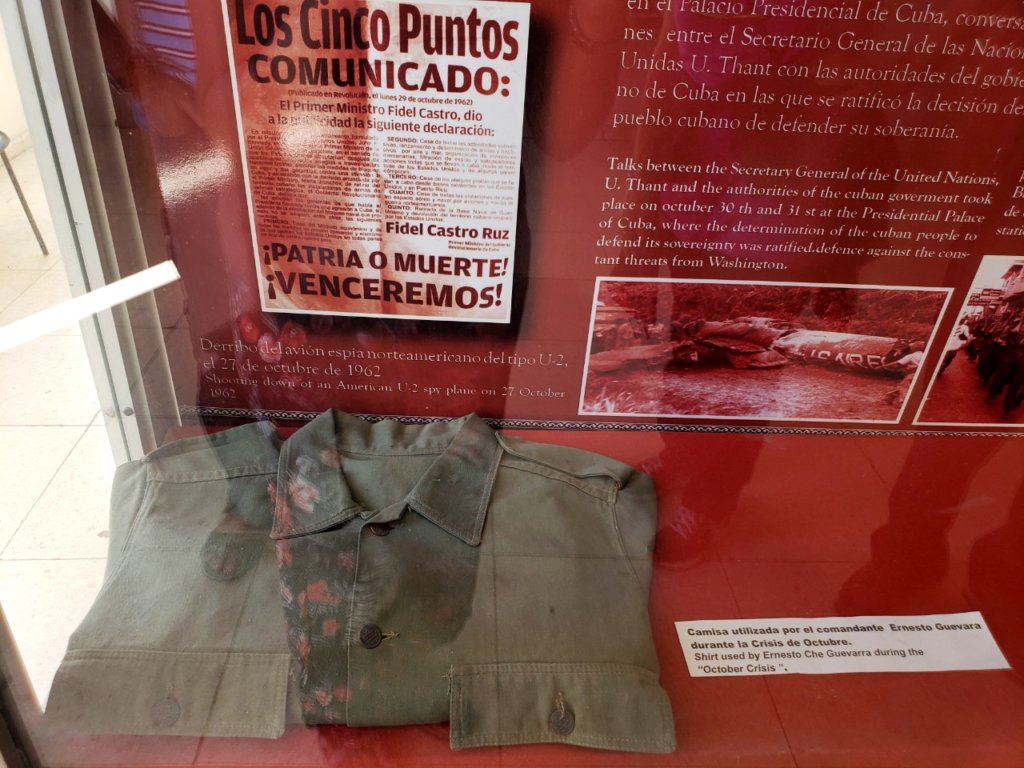
We hail from another part of the world (West Bengal, India) where interestingly Fidel Castro, Che Guevara and communist revolutions had huge political and social impact in the past few decades. So, as we walked from one exhibit to another, reading all the descriptions, I experienced different emotions. Sometimes my heart cried and sometimes my blood boiled. But throughout, we felt goosebumps! And Indranil and I could not stop thinking about how our respective fathers back in Kolkata, would react if they ever visited this museum. Because they lived their youth in the times when the administration in West Bengal was gradually being molded as per the communist ideologies. They would be thrilled to be in the Museo de la Revolución.
As you can see, we felt a strong connection with everything we saw in this museum. So, we ended up spending hours in there devouring every information inscribed there. Even if you do not feel that connection, this museum is a must visit place if you travel to Havana in Cuba – because it documents the past that defined the present of Cuba.
Castillo de la Real Fuerza | Castle of the Royal Force
Sandwiched between the Plaza de Armas and the west harbor of the city, lies the bastion fort Castillo de la Real Fuerza. You need to cross a small wooden drawbridge to get inside the castle. As you wander through the dimly lit rooms and alleys, admiring the exhbits, you keep wondering about the times when this fort was actually in use. It is considered to be one of the oldest European defense structure built in the Americas. After visiting the inside of the fort, take some time to take in the views of the harbor.
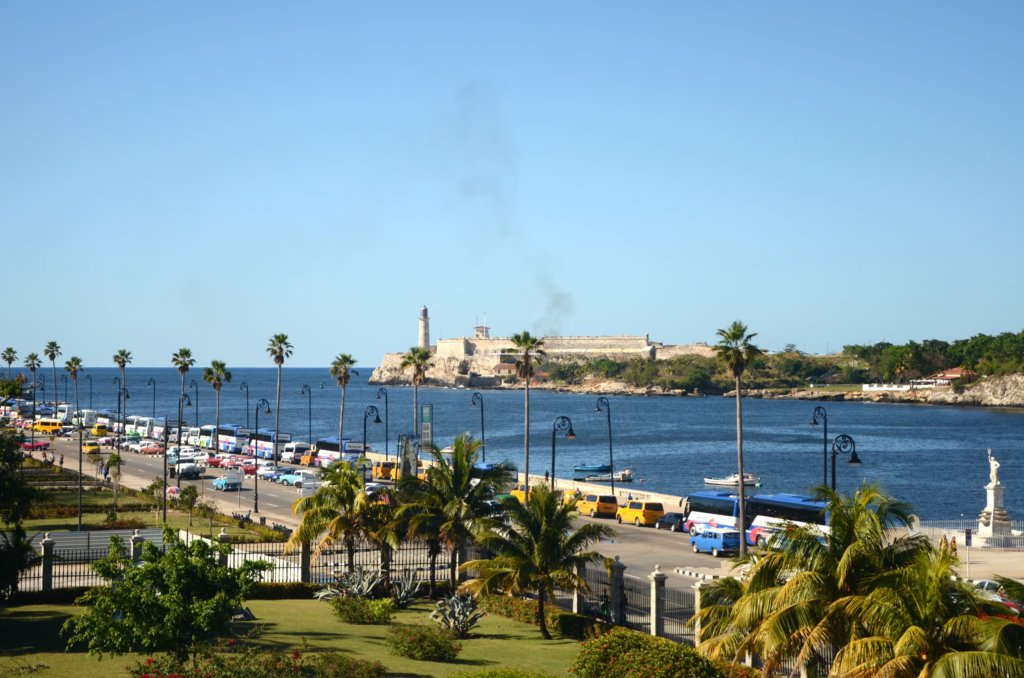
El Capitolio | The Capitol
El Capitol is the classic hallmark building of Havana, with a dome shaped architectural structure at the top. Marvel at this magnificent construction at the center of the city. The inside of the building houses a tall bronze statue La Republic, one of the tallest indoor statues in the world. El Capitolio has been under periodic renovations since 2013.
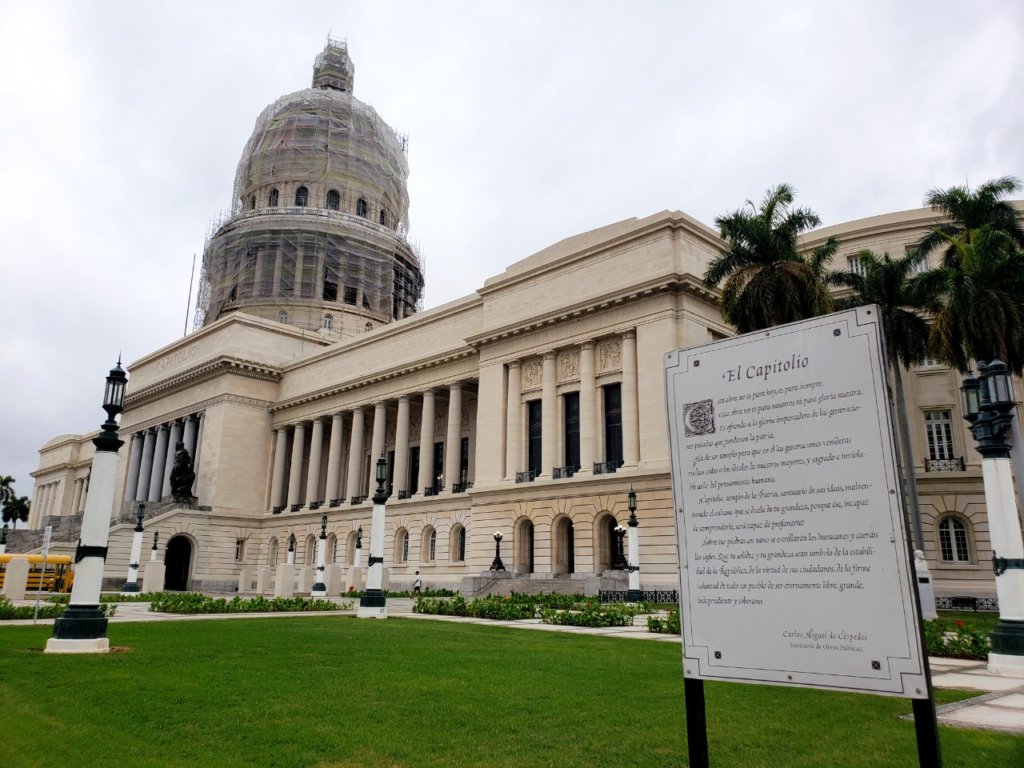
Parque Central | Central Park
Fountains and trees landscape the Parque Central where the locals of Havana hang out. The park is also close to some important buildings like the Museo de Bellas Artes and some high-end hotels like Iberostar and Inglaterra. Right where the action is, this is a great spot for watching Havana, where classic cars and classic buildings all come together in one frame with the local people.
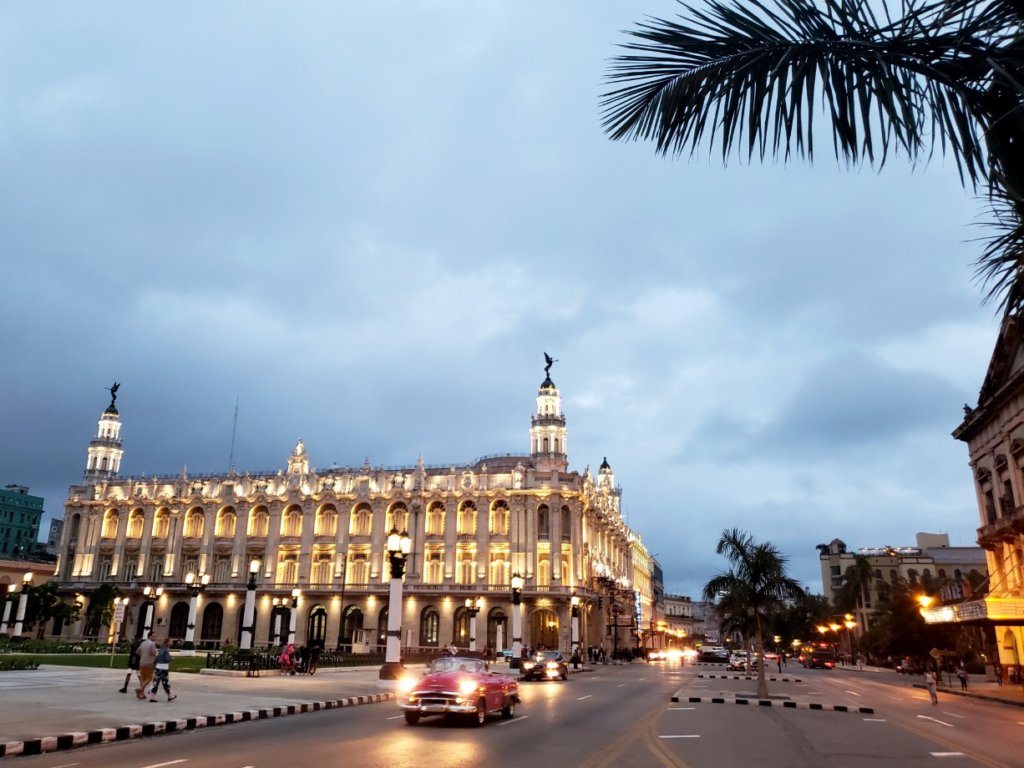
City plazas of Havana
We have observed that the Spanish colonial towns in different parts of Latin America are usually built with a similar blueprint. All towns have a main plaza which is basically the city center. Havana is a large city with 5 different plazas. You can visit most of these places on foot – but be prepared to walk a lot.
Plaza de la Revolución | Revolution Square
Witness to several political rallies in Cuba, the Plaza de la Revolución is the largest city square in Havana. Fidel Castro had addressed his nation from this very spot on several occasions during the Cuban Revolution. Now a center for important government buildings, the square stands out prominently for the large scale murals of Che Guevara and Camilo Cienfuegos and the Jose Marti Memorial. Definitely a must visit place in Havana, the Revolution Square can thrill the history nerd in you.
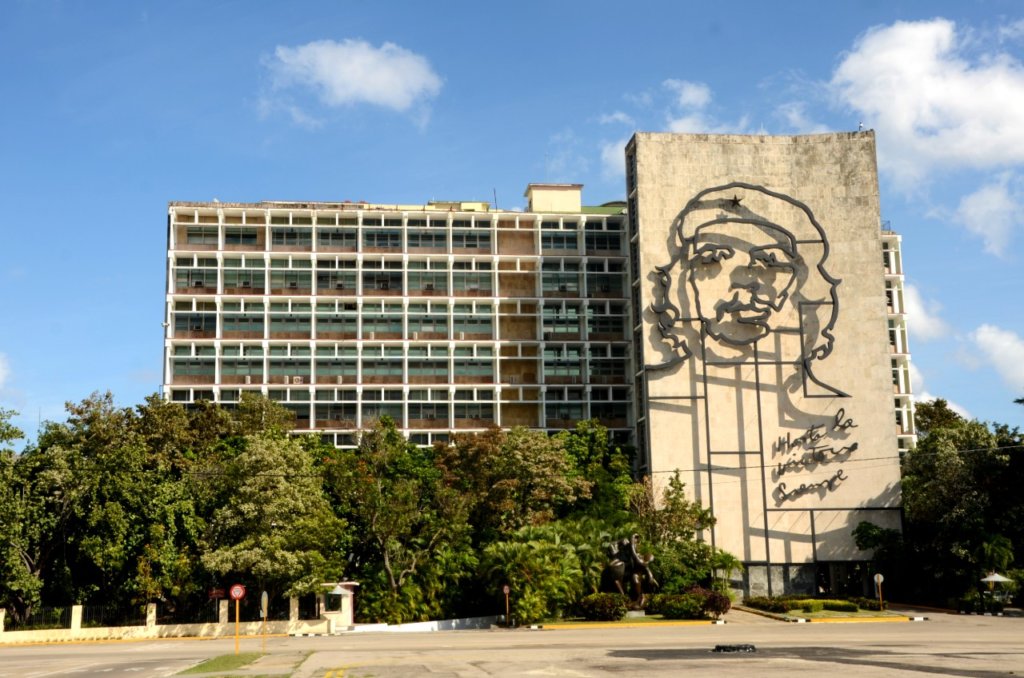
Since this square is a little further away from the Old Havana squares, you can visit this on a classic car ride of the city (more on that later).
Plaza de la catedral
As the name suggests, the most important part of Plaza de la Catedral is the Cathedral of Havana. The stone walls of the cathedral complement well with the cobble paved plaza and the adjacent mansions of similar earth tones. You can also spend some time at one of the pretty open air restaurants in the area.
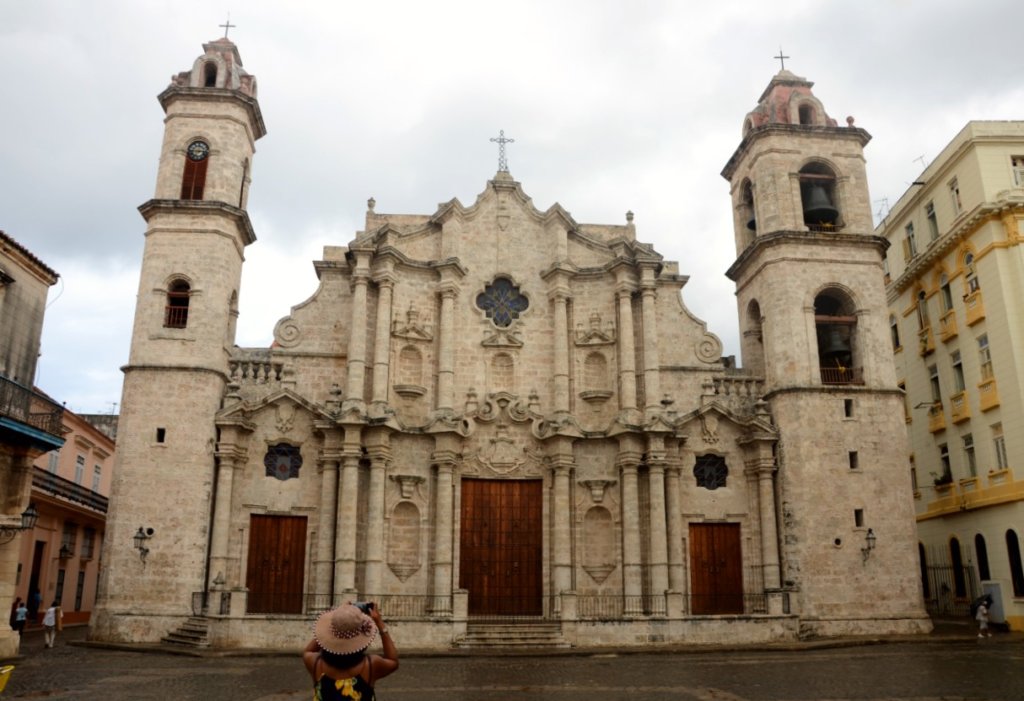
Plaza de San Francisco de Asis
Plaza se San Francisco de Asis is a 16th century plaza that went through a complete restoration in the 1990s. Just inland of the Havana harbor, cobblestone ground, an old church, a fountain and some metallic art work adorn this square.
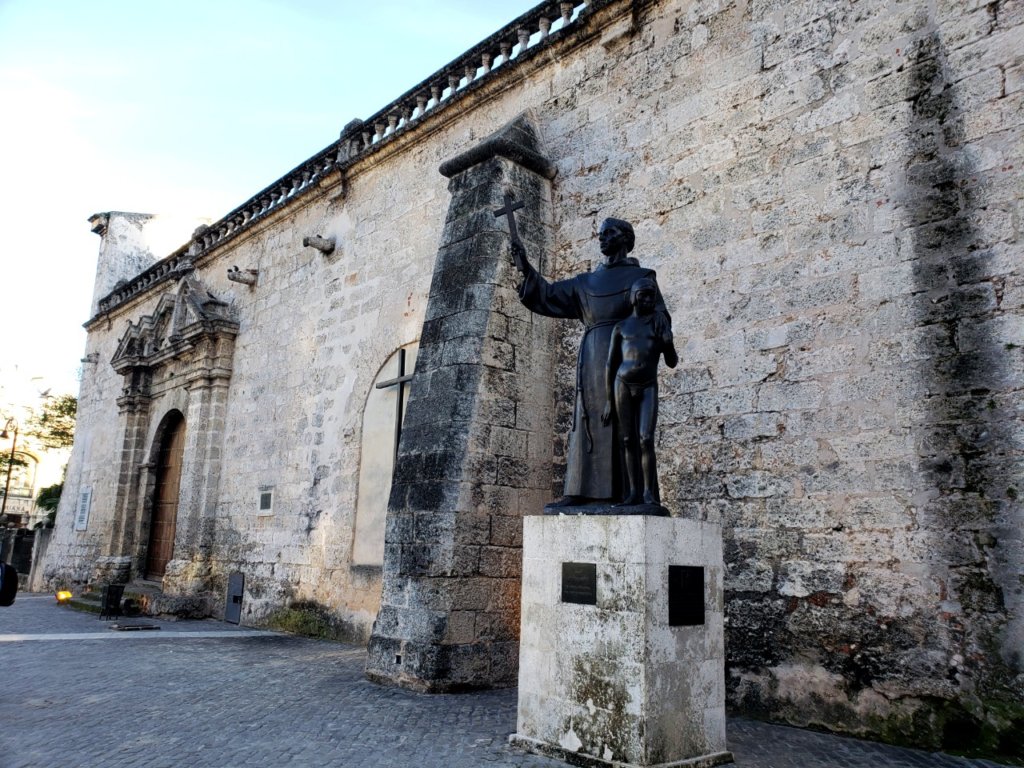
Plaza vieja
Plaza Vieja had always been center of residential buildings of wealthy Cubans. Even now, you can find colorful colonial buildings at this plaza. The center of the plaza is decorated with some iron structures like an artificial fountain at one corner and a woman on a rooster at another.
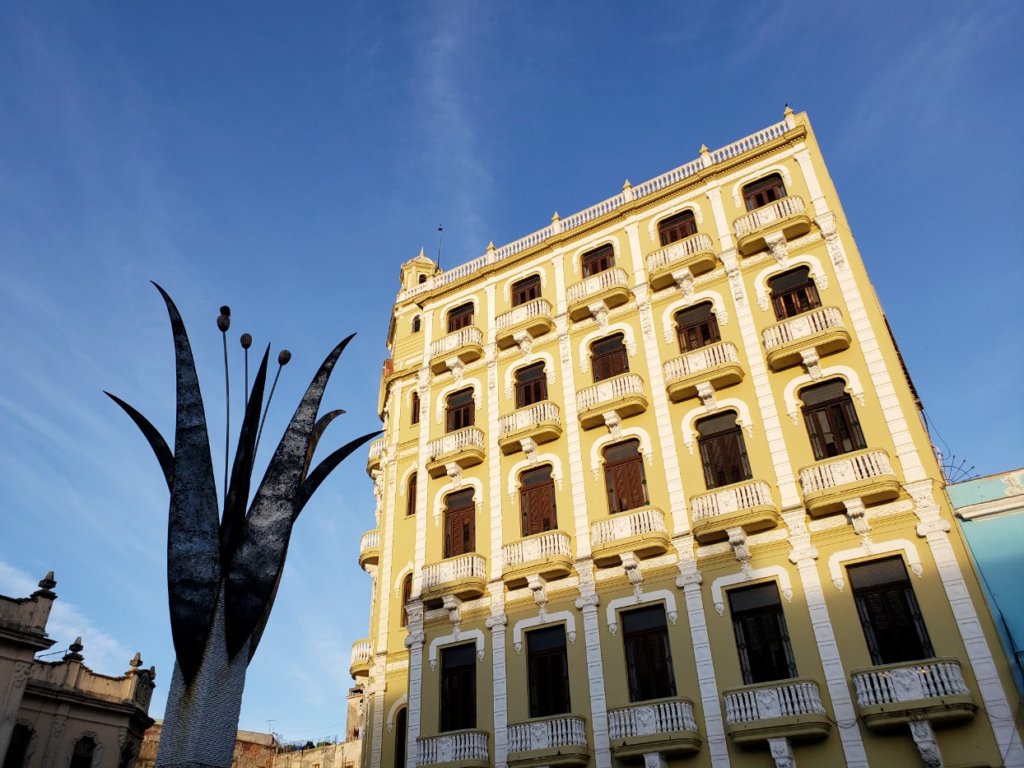
Plaza de Armas
At the end of the bustling Obispo Street, lies Plaza de Armas, one of the oldest city squares of Havana. The white marble statue of Carlos Manuel de Céspedes stands as a center piece of the plaza. He was a revolutionary who had started the Ten Years’ War in 1868, the first of the three freedom wars that Cuba fought for its independence from Spain in 1898.
When you visit the Plaza de Armas, reserve time to visit other historically important attractions in the area – like the former governor’s residence Palacio de los Capitanes Generales, El Template Museum or the Museo de Navegación which has exhibits from various maritime discoveries.
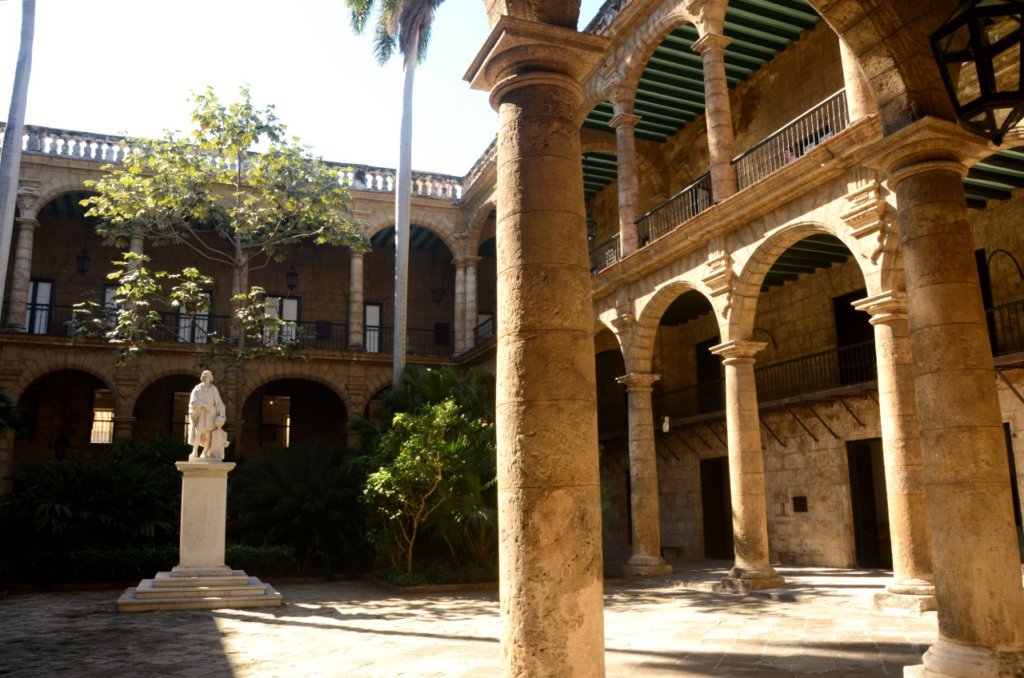
Quirky experiences in Havana
City tour in classic car
We keep saying Cuba is not just about classic cars and iconic buildings. However, when you are in Cuba, riding a vintage car is an experience that you will not want to miss out on. And with so much history tagged to its past, Havana seems to be a fitting location to experience this.
We took a one hour tour in a chauffeur-driven classic convertible pink Chevy. An English speaking guide also accompanied us. The tour starts from the Parque Central area of Old Havana, goes past different locations, includes a stop at Plaza de la Revolución and returns back to the starting point via a different route (Malecon).
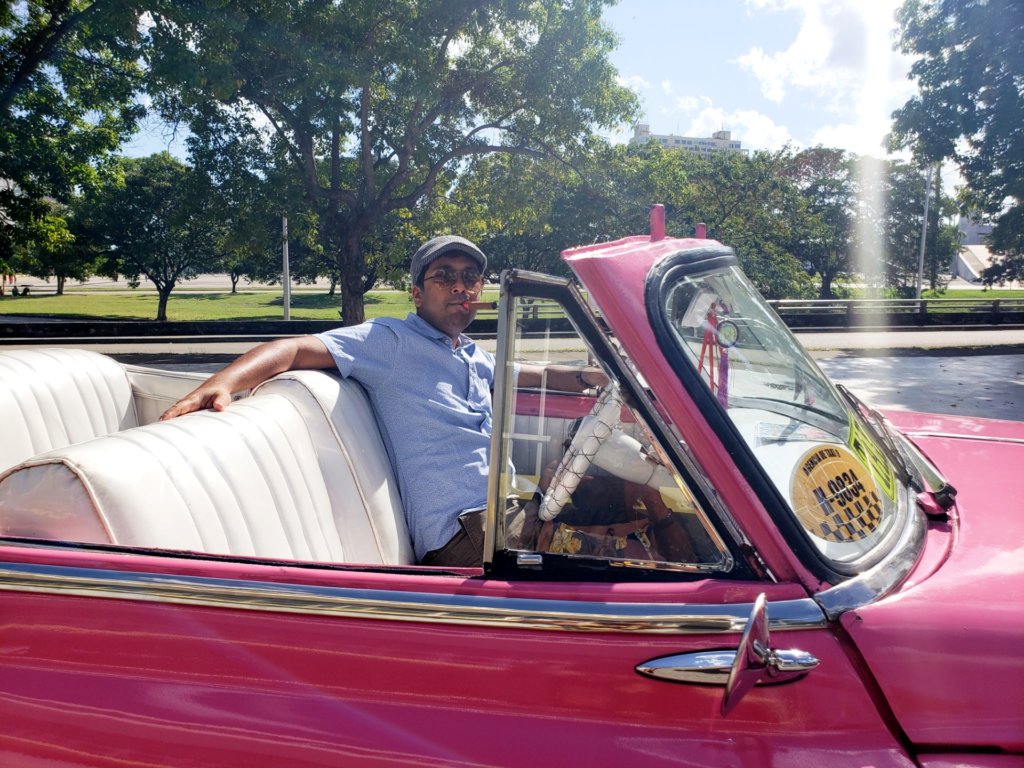
Walk along the Malecon
Cuba is surrounded by water-bodies like Atlantic Ocean, Gulf of Mexico and Caribbean Sea. So, naturally there is no dearth of good beaches here. However, Malecon is not a beach. It is an 8km long stretch of roadway and seawall running from the north to centro. You will probably ride a car along this road during your classic car tour or during other commutes in the city.
Even then, find the time to walk along the Malecon on the broad pedestrian pavement running along the seawall. Goggle at the pastel colored vintage cars zoom by. Listen to the sounds of the Atlantic splashing against the wall. Watch the locals holding hands or dancing together or just leaning on each other facing the sea. Take a good view of Old Havana with the Capitol in the background. Feel the breeze on your face.
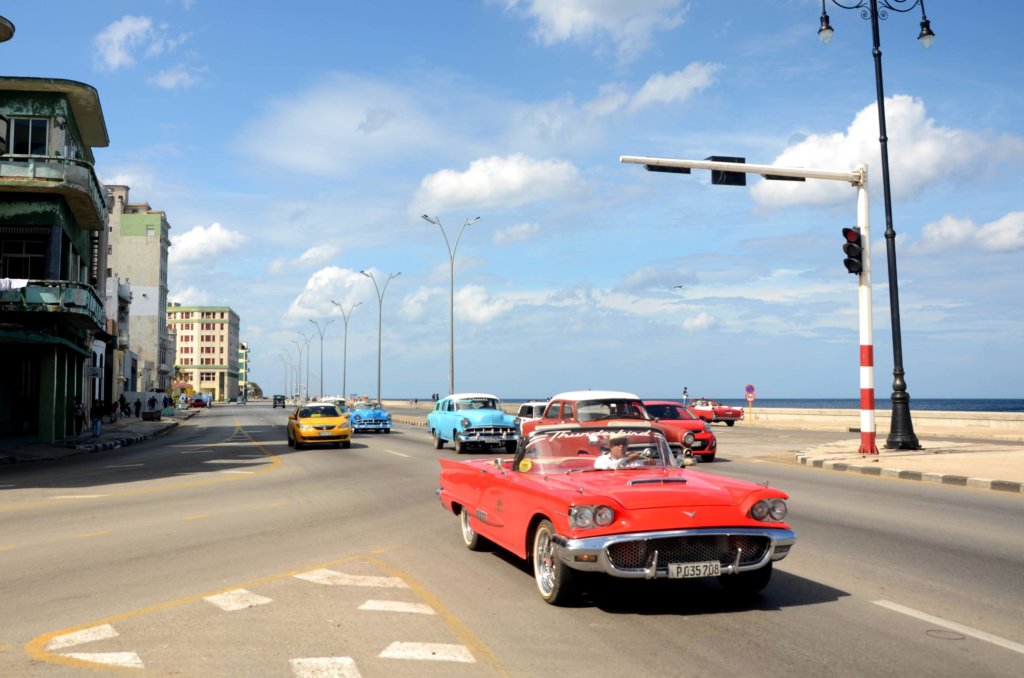
Stroll the Obispo Street
Watch the hustle and bustle of the city while strolling the Obispo Street. Day or night, this street is always swarming with people, locals and tourists alike. While you are busy people watching, slowly take your pick from the plethora of options around – shops, bookstores, hole-in-the-wall eateries, restaurants, ice-cream parlors.
You can also buy the internet card here at the ATECSA office. You can read here why the internet card is important and what else to expect from your visit to Cuba.
Souvenir shopping
For most kinds of travelers, souvenir shopping is almost synonymous with traveling. And Havana is a good place to pick a few memorabilia. Wander through the streets and you will find plenty of shops and street vendors. Some popular souvenir items from Cuba are oil-paintings depicting Cuban history or Cuban life and wooden figurines of Cuban musicians playing native musical instruments.
Since the time we moved to Costa Rica, we have been consciously avoiding any addition to our material possessions. But I will shamelessly admit that small easy-to-carry souvenirs have been our happy exceptions. Hence we brought back from Cuba a few keepsakes. But we consider the most prized among them all a morning issue of the local newspaper, ‘Granma’!
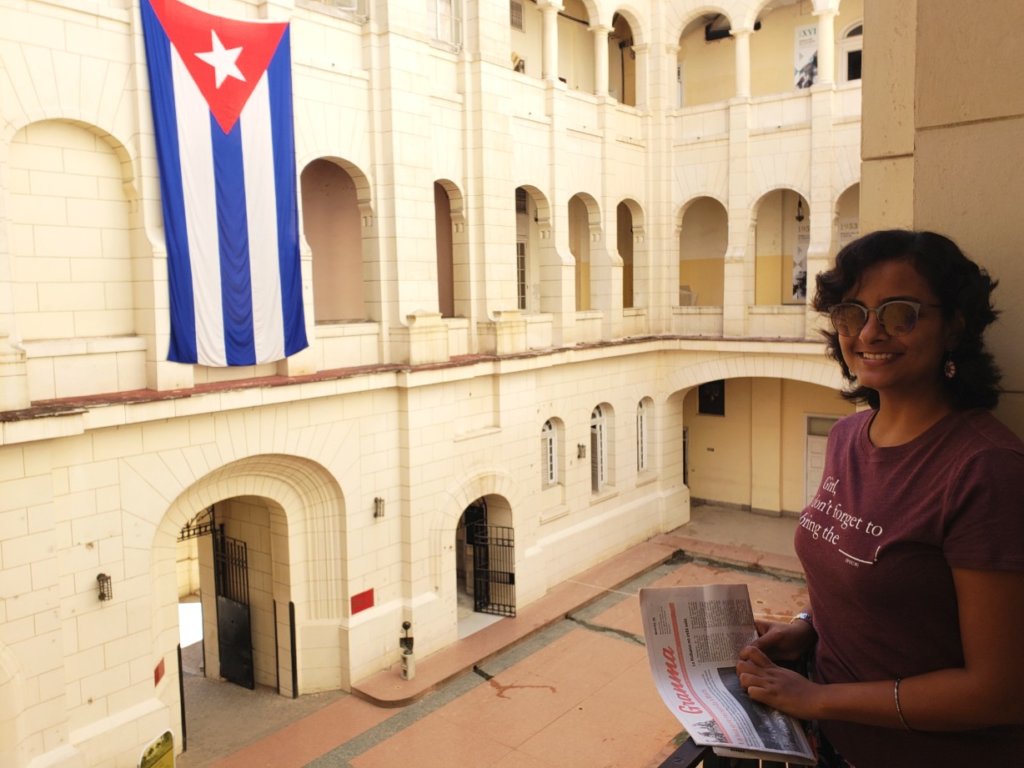
P.S: Talking about things you would like to bring back home from Cuba, you cannot miss rum and cigar. For the rum, we would suggest buying it from the duty free at Havana airport before departure. For cigar, although many people may recommend buying cigar as a top thing to do in Havana, we would say – Hold on, wait for a more authentic setting. [Stay tuned for the next post about Cuba]. But, if you prefer branded cigars in fancy packaging, then look for Government cigar shops. We had bought from one of those. Our guide on the classic car tour helped us locate it.
Browse old books at the small bookstores
Several bookshops line the streets of Old Havana. Most of them sell second (or n-th) hand books from very old publishing houses. We visited many such bookstores. But I vaguely remember any new book in any of those stores. And I think that is exactly what makes them so special.
If you are a bookworm, imagine this. On a rainy evening, standing in one corner of a tiny bookstore in Havana, Cuba, you are browsing through the yellow pages of battered books on Cuban history, written by Cubans and published by Cuban publishing house. Do you feel it? Nah? No worries. Then this may not be a top thing for you to do in Havana.
P.S: Yes, of course, we bought one such timeworn book! 🙂
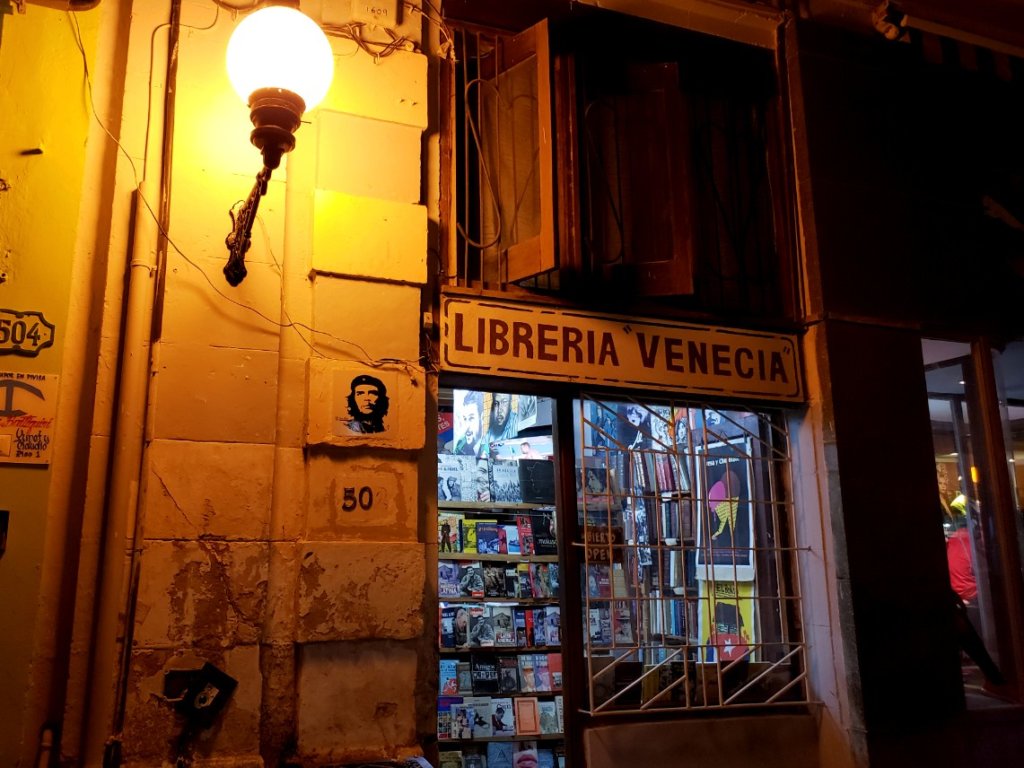
Signature drinks experiences in Havana
Mojito at Bodeguita del Medio
You will have the best mojitos of your life in Cuba. And the Bodeguita del Medio in Havana claims to be the birthplace of this widely popular cocktail. Of course, you will want to check that off as one of the top things to do in Havana. Naturally, this place is wildly crowded.
But according to our experience, the crowd gathers more for the reputation than for the quality of product and service. It may be interesting to watch the bartender incessantly making glass after glass of mojito. But it’s a quick pay and get your drink service, after which you need to find a place to sit. Most likely you will stand, jostling for some square inches of floor space among several others. Also, the mojito there costs 5 CUC as opposed to an average of 3 CUC at other bars. And Bodeguita’s is not even the best mojito we had in Cuba.
This bar is known to have been patronized by many stalwarts, including the likes of Pablo Neruda and Ernest Hemingway. To leave your footprint (or rather hand-signature) there, you can write your names with markers on the walls of the bar, inside and outside. But most likely, you will not be carrying a marker while traveling. Here comes another of the many opportunities that the locals have created to earn money. They will offer the marker ‘for free’ and then after you sign, they will ‘charge you a tip’. This time, we did not fall for it.
So, if you want to do a ‘bucket list’ activity in Havana, this is a must. Else, you can skip this. You will find several good mojitos around in Cuba.
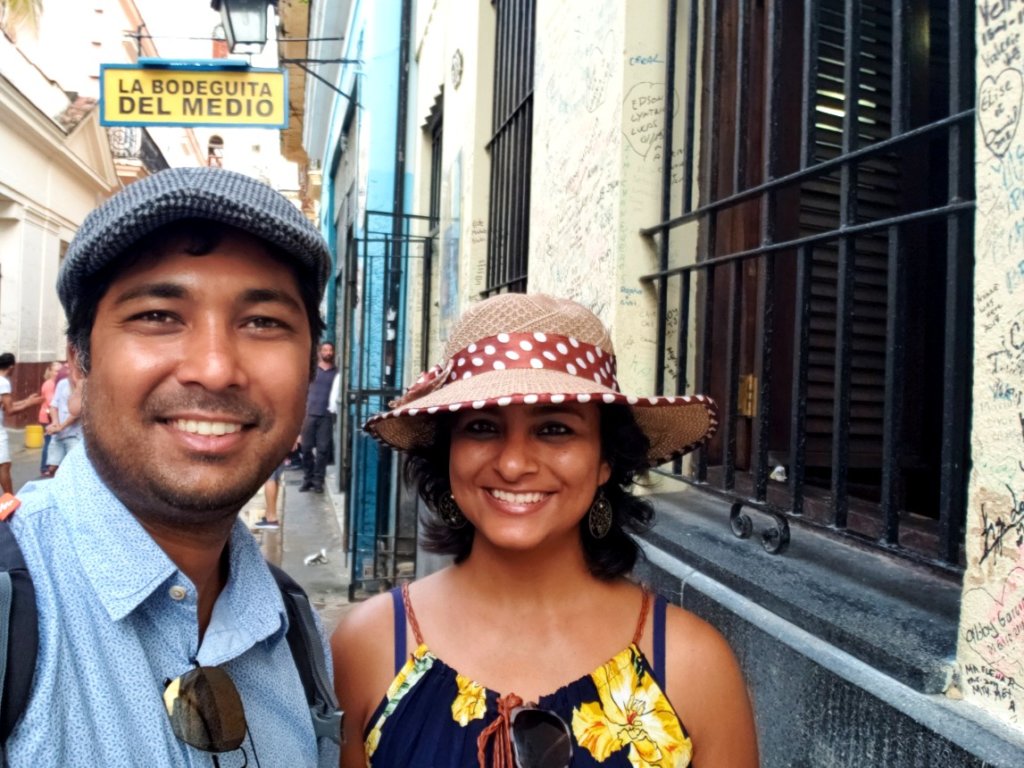
Daiquiri at El Floridita
If Bodeguita del Medio started mojito, El Floridita is the cradle of daiquiri. This place is also crowded and pricey. They charge 6 CUC for a daiquiri. But compared to Bodeguita del Medio, I found this bar classier, the music more lively and the cocktails better, overall exuding a more fun vibe. Indranil and I tried different variations of daiquiri (they have options) and we liked both. Also, this is THE bar that Earnest Hemingway frequented. They even have a bronze statue of Hemingway. According to us, do not skip a drink at El Floridita!
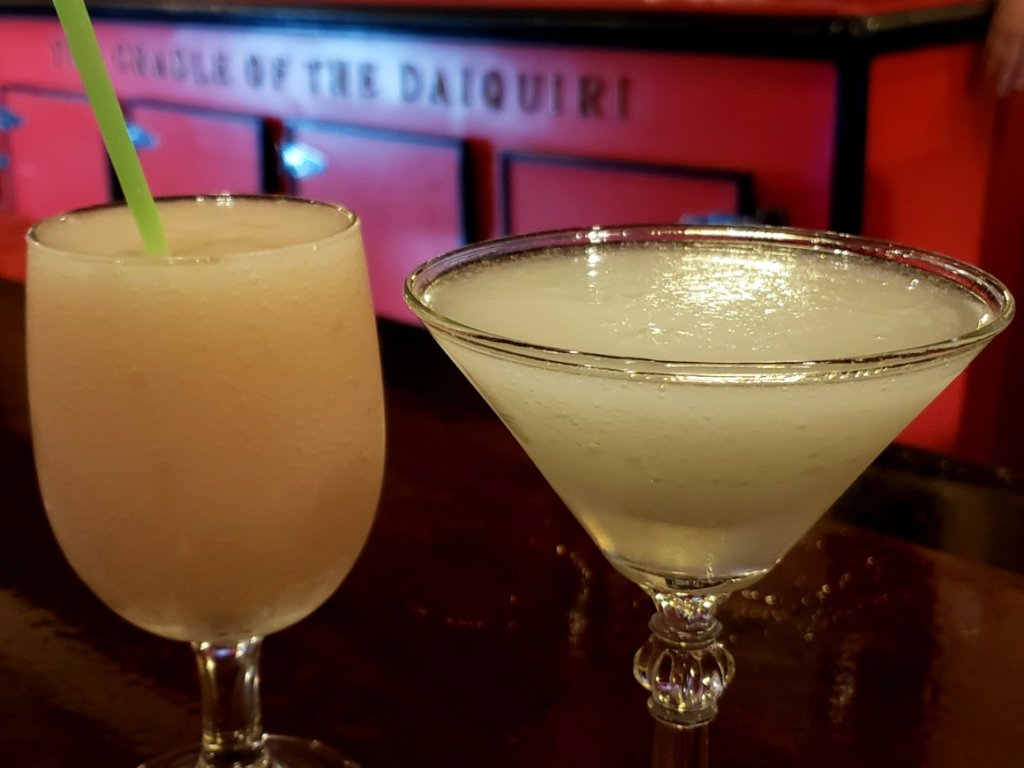
Sunset at rooftop of Ambos Mundos hotel
Ambos Mundos hotel has a rooftop bar (I think 5th floor). This is a good place to grab a late afternoon drink, get a view of the lost-in-time Havana city while watching the sun set over the dilapidated buildings.
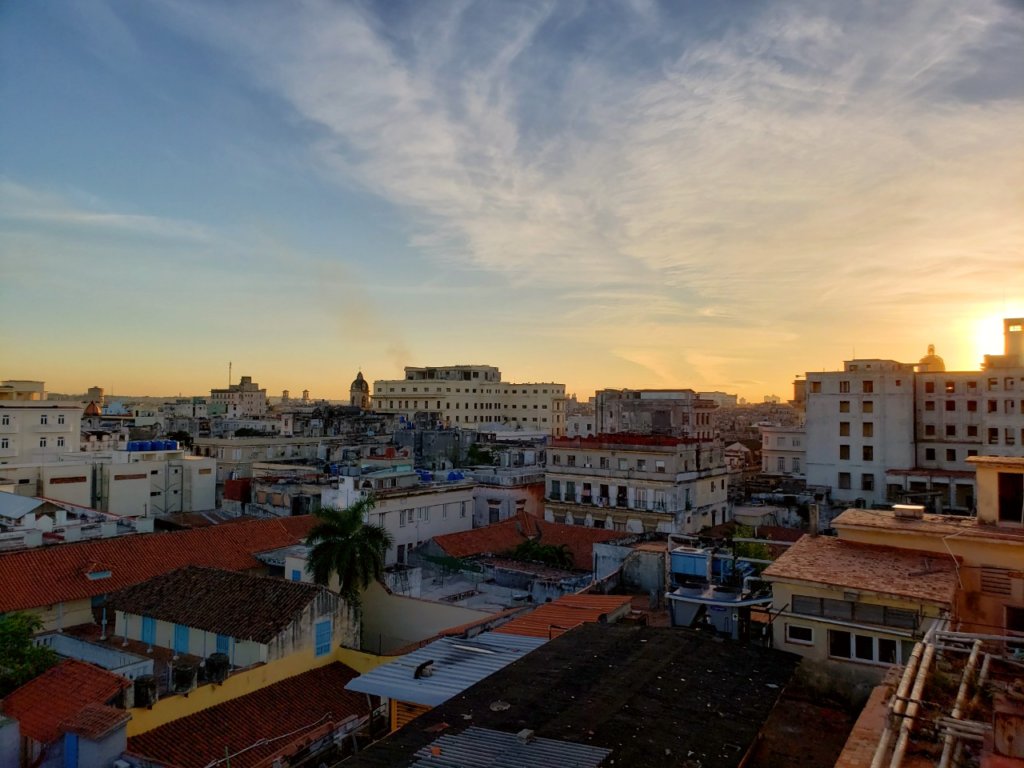
Museo del Ron, Havana Club
Havana Club is the most popular and probably the best brand of rum in Cuba. You can take a 30 minutes tour of their museum where the guide will walk you through all the process of harvests and production. This 7 CUC tour also includes one shot of Havana Club 7 years rum.
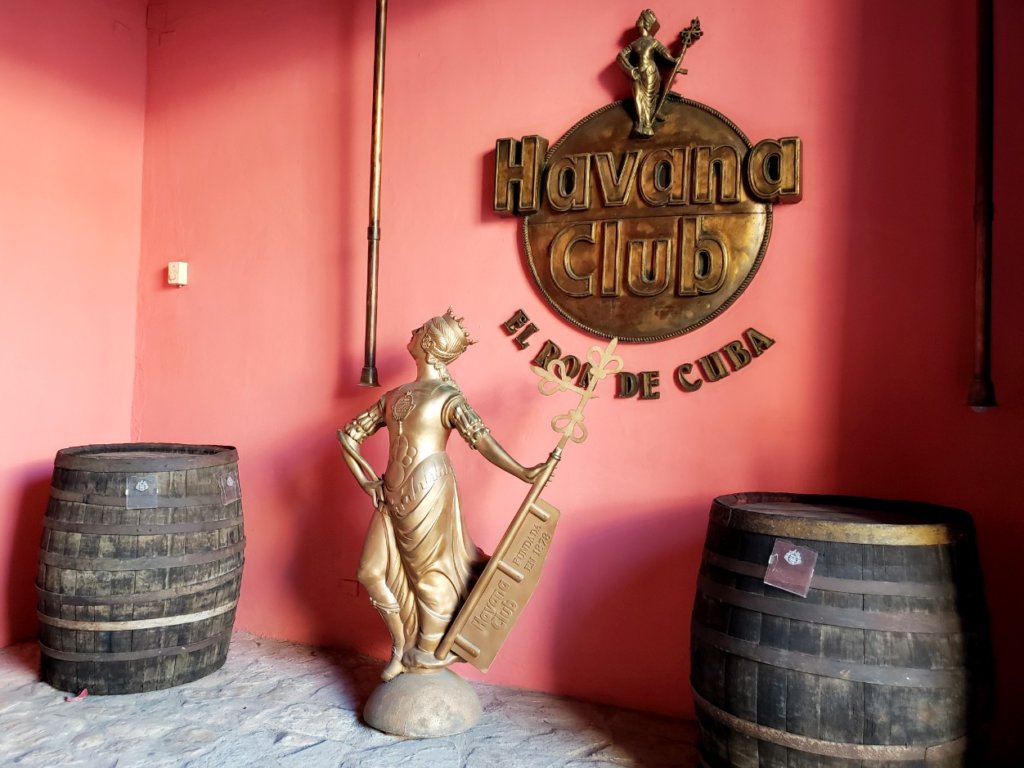
Art, culture, performances in Havana
Callejon de Hamel
Callejon de Hamel is a narrow alley that is loaded with art and culture, depicted in an Afro-Cuban style. Cuban artist Salvador Gonzáles Escalona adorned this street next to his house with murals, paintings and sculptures. As described by the artist himself, his work is a combination of surrealism, cubism and abstract.
Take a walk along this alley, admire the art work and absorb the culture around you. If you wish to add some fun quotient to your Callejon de Hamel experince, visit on a Sunday afternoon when they have live rumba performances. Also, remember to try El Negron when you visit. It is a signature cocktail from the area, and is made with rum (of course!), water, honey and basil.
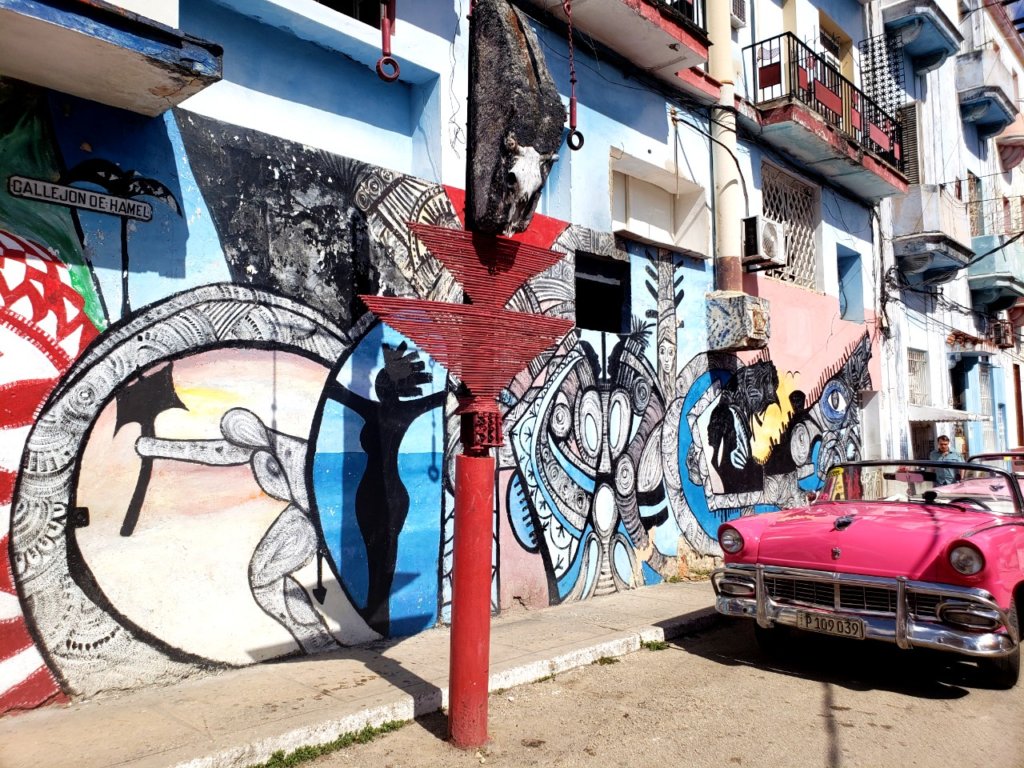
Performance at Cabaret Tropicana
Cabaret Tropicana is a performance art theater that has been entertaining its classy patrons since 1939. Visit the club for a night of musical extravaganza in a premiere setting. The Cuban artists, clad in dazzling costumes, sing and dance to the cheerful and dramatic tunes of Cuban music. All performers synchronize to perfect harmony and put together a splendid show.
An evening at Cabaret Tropicana is not quite easy on the pocket. In fact, this might end up being your most expensive activity in Havana. And right from the entrance, you will know why. After the initial check-in, as you walk in to the seating lounge, you will be greeted with big smiles and a rose or a cigar, depending on your gender(!!). After you are shown to your designated table, a butler will serve you through the evening. The show ticket includes a serving of a quarter bottle Havana Club Special Old Rum, a can of soft drink and peanuts. This gets you started for the evening, as you settle down for the musical show. If you bought the tickets for ‘Show + Dinner’, a three-course meal will be served on your table. For each course, you get to choose from a menu of two to three options.
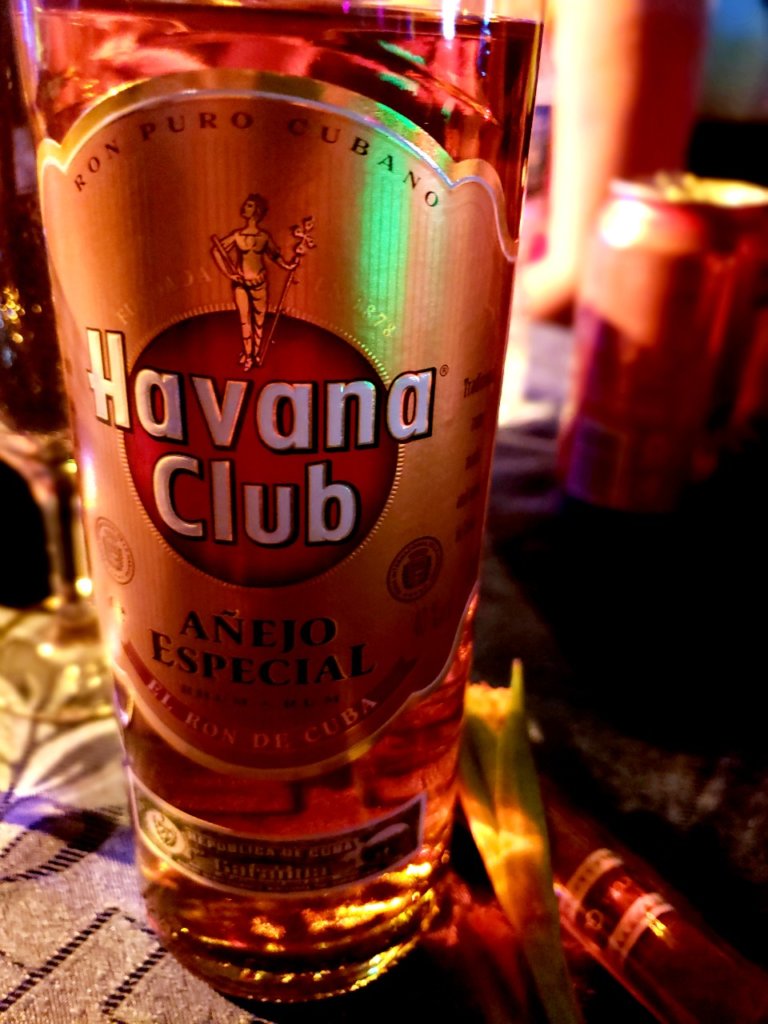
The evening show at Cabaret Tropicana is a highly sophisticated experience, reflecting the glitz and glamour of Cuba – a stark contrast to the world outside the walls of the club.
Booking process
You can book the tickets online on their website prior to your visit to Cuba. You will need to choose if you want to watch the show only or if you want to purchase a show+dinner combo ticket. For each of ‘Show Only’ and ‘Show + Dinner’, they have three different pricing options, depending on the seat option you chose – standard, plus or premium.
Street live music
Even if you decide not to pay for a fancy live performance, no need to worry. You will not be deprived of good old Cuban music. You can find lively vibrant music performances everywhere. The street you pass by or the restaurant you go to for dinner or at the bar where you visit to grab a mojito. Everywhere.
Canon fire ritual at La Cabaña fort
La Cabaña and Morro are 17th century Spanish fortresses that guarded Havana’s bay area. The Spanish had built those to protect their colonial settlement in the island from maritime attacks, by pirates or by rival powers. In the present era, the forts serve as interesting tourist destinations.
Every evening, soldiers clad in Spanish military uniform parade onto a high platform of La Cabaña fort. Their uniforms and their artillery both seem to be of a bygone era. In the dark of the night, they perform some drills under firelight before they fire a canon. Sharp at 9:00 pm local time. This announces the closing of the city walls.
You can argue that this should have been included into the first section (History of Havana) of this post. But wait. Although the drill is based on historical practices, this essentially is a performance! They stage the entire ritual every night as a show. The soldiers are actually actors in their costumes. You actually need to buy a ticket to go and watch this show.
Some people get wowed by the fact that they are watching a military ceremony, almost traveling back in time. Some people get astounded by the light and sound of a canon firing. And others dismiss this as a mere acting performance. So, when you are in Havana, buy the tickets, watch the show and decide for yourself if this qualifies for you as one of the top things to do in Havana.
Tips to make more of your time at the canon fire ritual:
Reach early so that you have enough time to find a good spot. Else, you may end up standing behind hundreds of people. In that case, you will be at the mercy of their heights on how much of the show you can actually see.
A night market decorates the pathway from the ticket counter to the area of the event. Spend some time there and pick up indigenous souvenirs but remember to bargain!
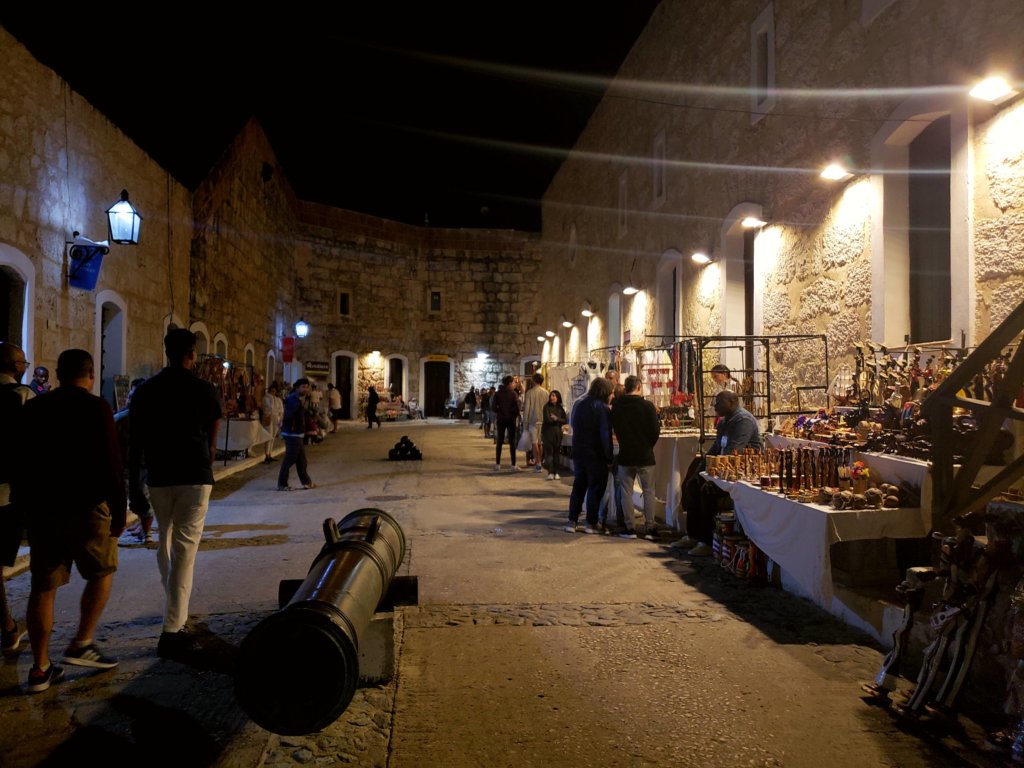
Remember to take in the views. Before or after the event, as you stand in the darkness leaning against the walls of the fort, you will see a river glistening. On the other side of the river, the light adorned night landscape of Havana city looks stunning.
What else?
Over a period of a few days since you enter Cuba, when you are done with visiting all the plazas and the museums, you may still crave for some more taste of Havana. Just keep walking. You will not be disappointed. Do not hesitate to aimlessly wander into unknown lanes and by-lanes. As per crime statistics and according to our personal experience, Cuba is safe and Cuban people are very friendly.
You may not know where the path is leading to. Does not matter. Listen to the old buildings on either side of the streets. Observe the life go by. May be you will meet some new people. May be you will discover a cute cafe spot. Or may be, nothing will happen. But when you come back, you will probably feel that you have started to get a grip of the pulse of Havana.
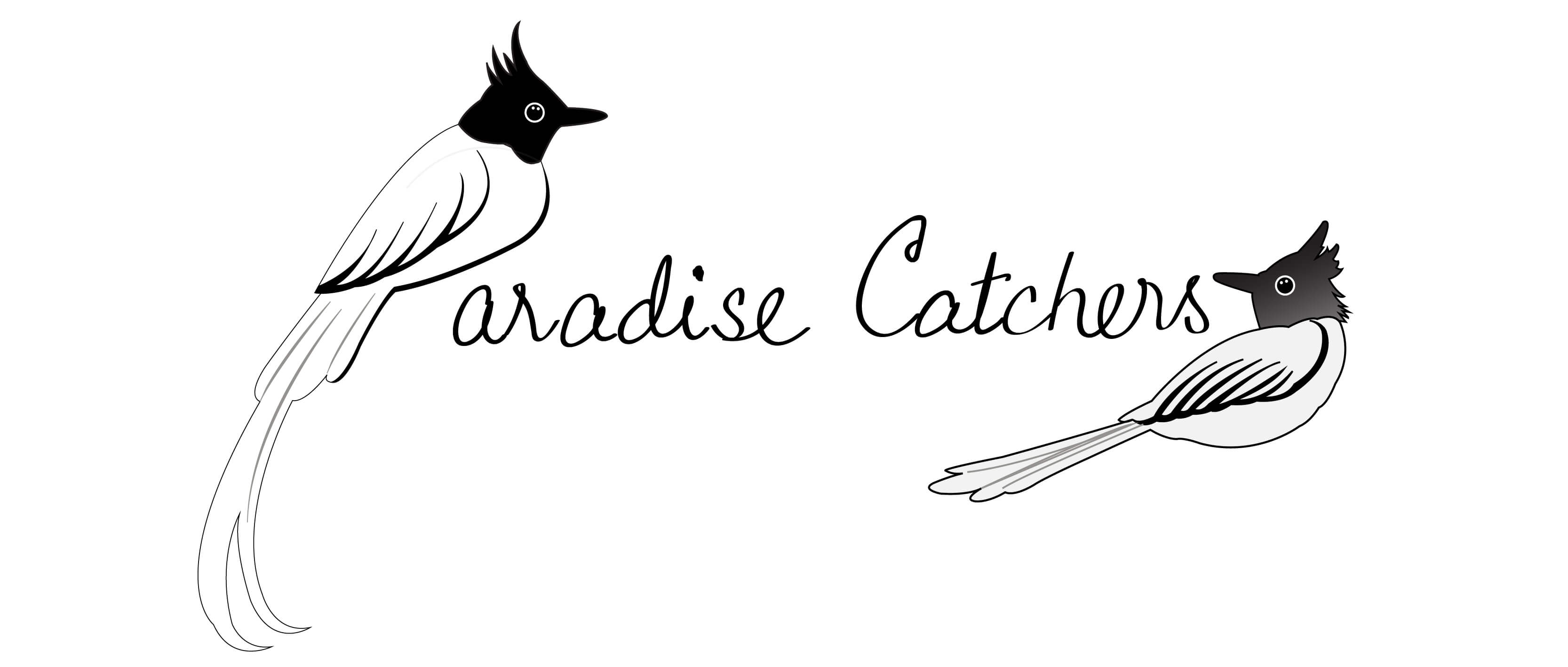
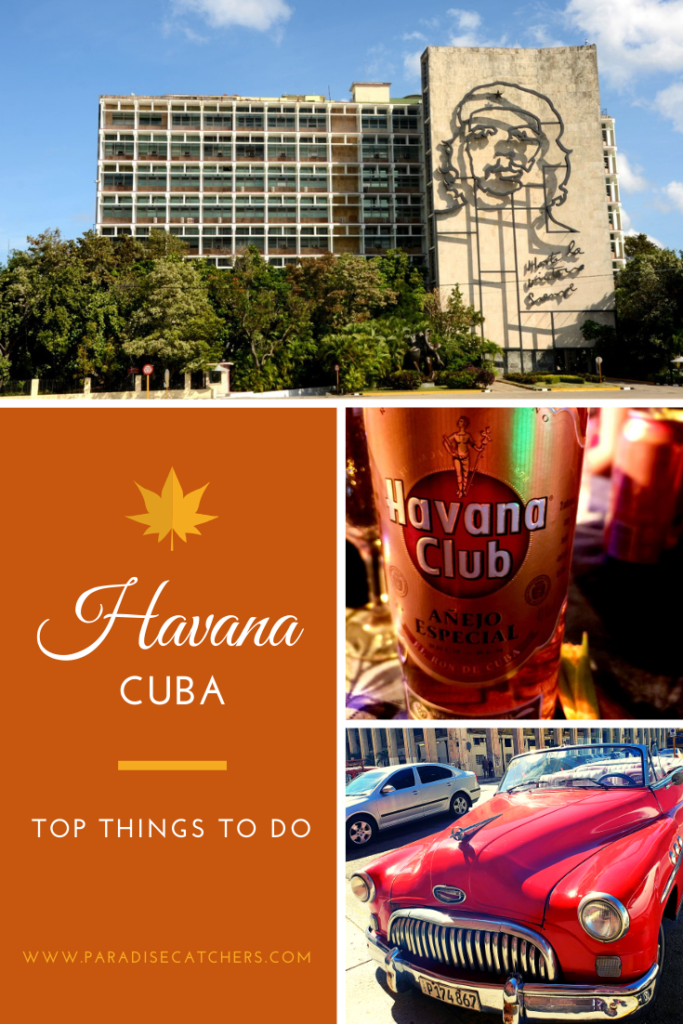
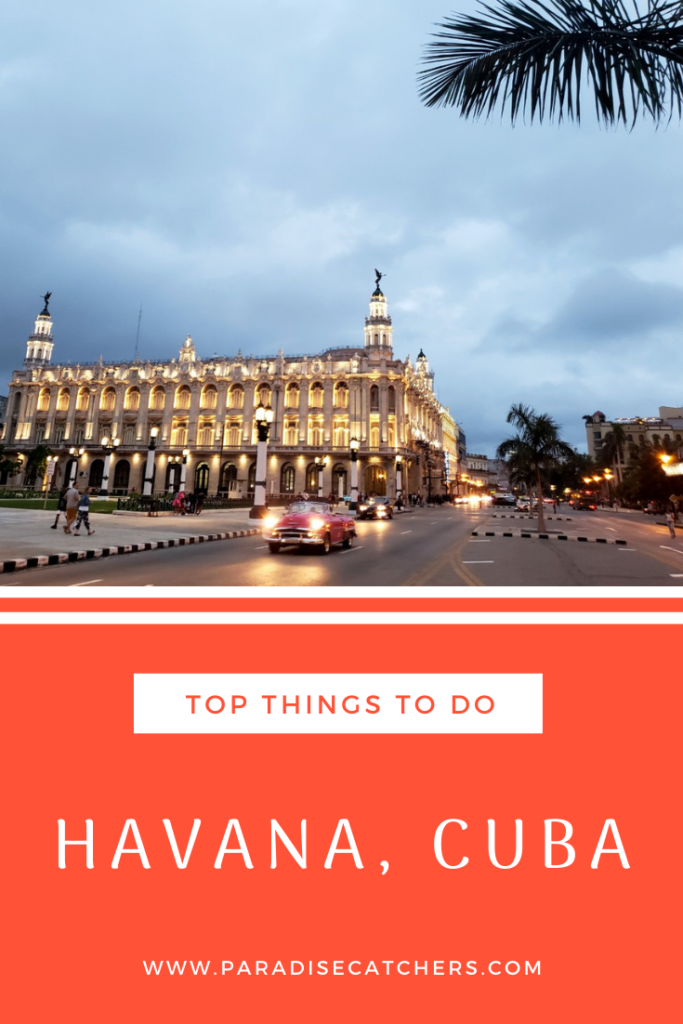
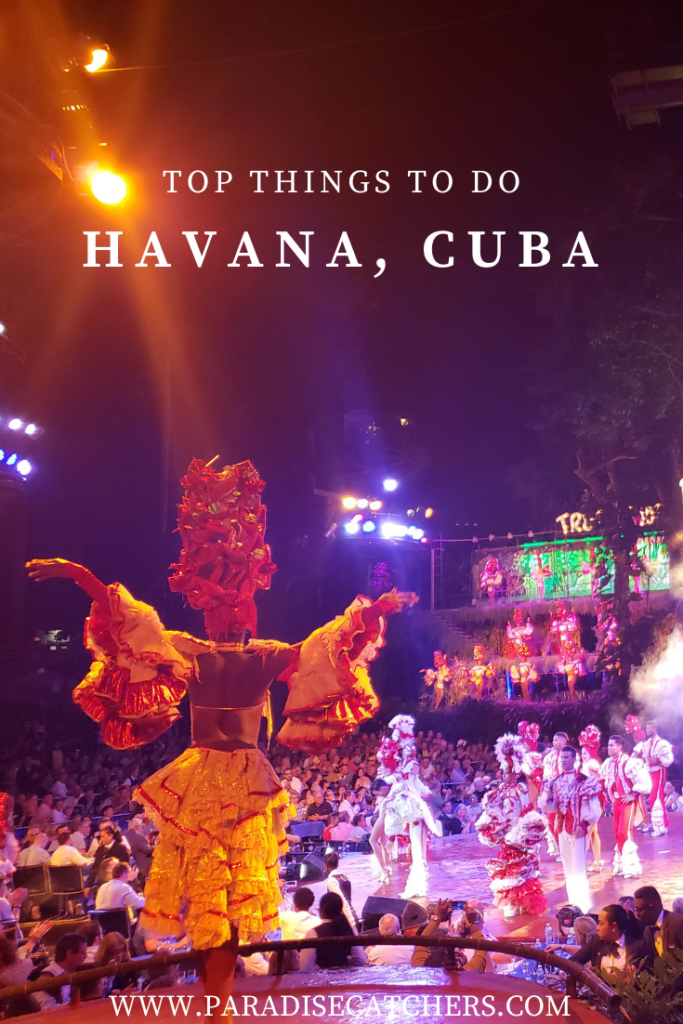
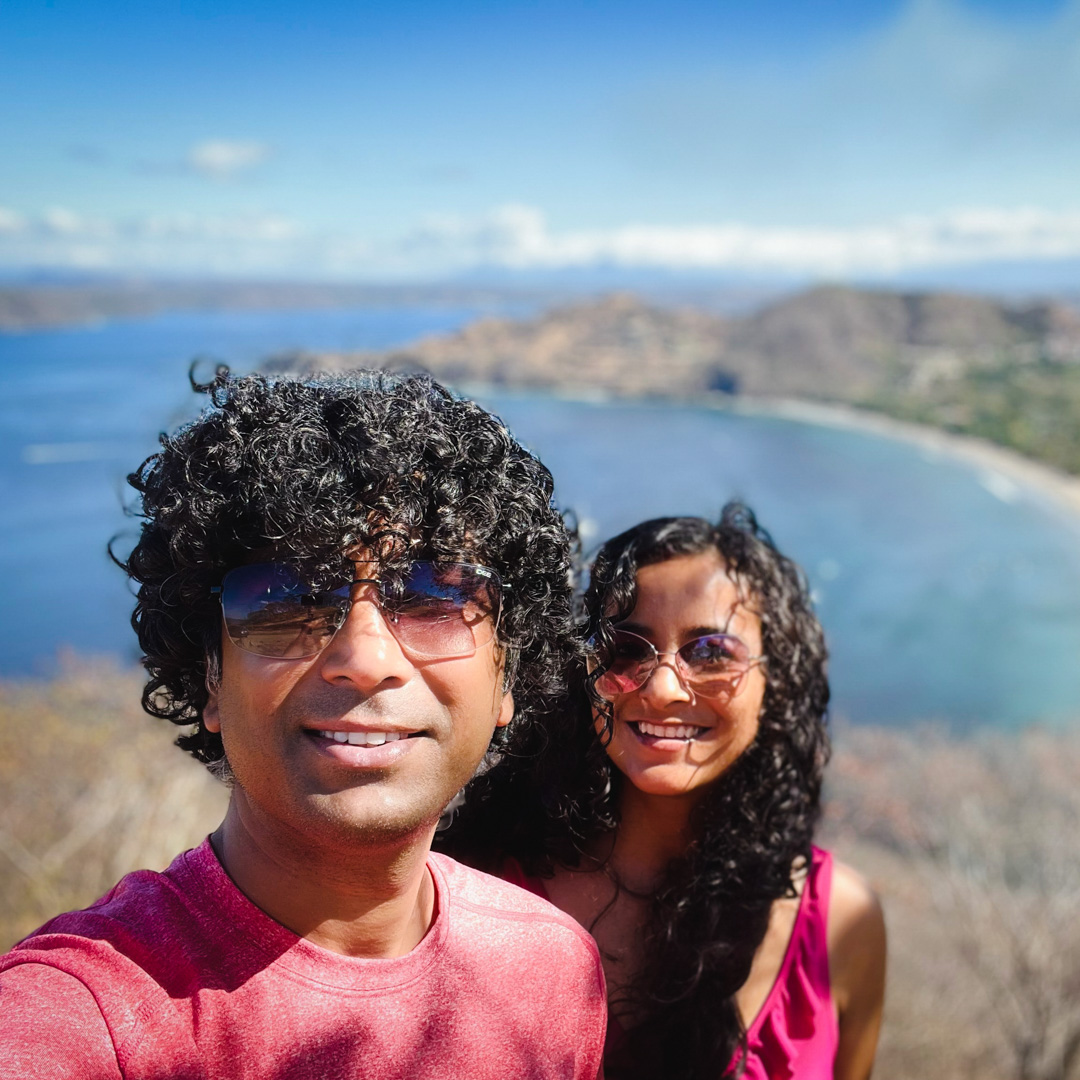
Wonderful! I would love to go to Cuba, but it is not easy as a US person. Have you ever traveled outside Havana and would you recommend it to someone who does not speak Spanish?
Hi Rudy, agree that traveling to Cuba as a US citizen brings some additional challenges, but it is still possible to visit (you need to choose a specific reason of visit from a series of options). During our trip to Cuba, we did actually travel beyond Havana – we had been to Vinales, Varadero and Trinidad as well. You can definitely visit Cuba even if you are not a Spanish speaker, but I would recommend to pick up some conversational Spanish before the trip, so that it is easier for you to connect.
Such a comprehensive guide, thank you for sharing it! Havana is one of my favourite places I visited, the atmosphere was just uncomparable to anywhere else I was and your post brought back all the good memories 🙂 Keep the happy travels!
Thank you Anna. I can imagine what you’re referring to. Even while writing this, I felt like going back to experience the mystery of Havana once again. 🙂
I have wanted to go to Cuba for so long. It looks like it is fabulous.
It is! 🙂
Havana is amazing, and I didn’t spend nearly enough time there on my trip to Cuba. All I had time for was the hop-on bus tour to see a couple of sights. It’s certainly a city with so much history about it and I need to go back and discover some more the gems you’ve listed here.
Thanks Becki. The bus tour may have presented a teaser-trailer of Havana to you. Now you can plan to go back to experience the full movie. 🙂
So many wonderful things to do in Havana! I REALLY want to go sometime soon! Especially to see all of those beautiful plazas and the cathedral! Thank you for such an inspiring post!
Thanks Cate. We are glad that this post inspires you to travel to Havana.
This is such a well written post about things to do in Cuba that I will pin for future reference – I’ve always wanted to visit. I love Live street Music!
Thank you Jen!